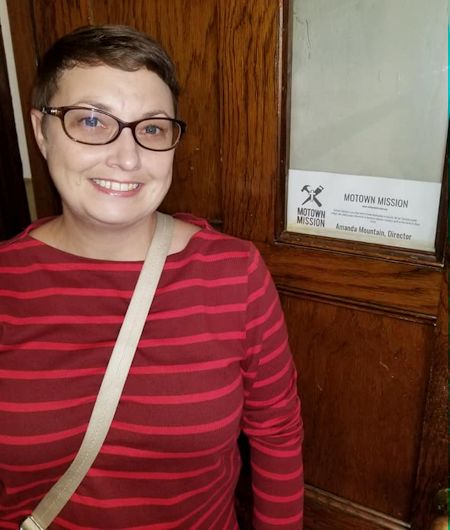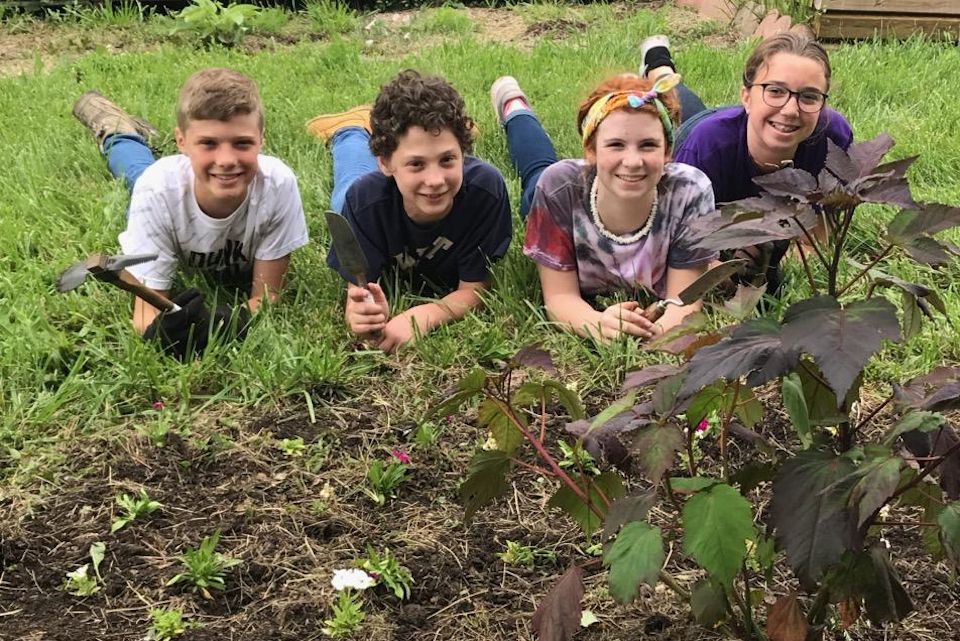Deaconess Amanda Mountain discerned her gifts for ministry. Pentecost is a time when everyone can pause and do just that.
KAY DEMOSS
Senior Content Editor

May 23, 2021, is Pentecost. This is an annual opportunity to say, “Happy Birthday, Christian Church!” It is also a good time to talk about the gifts the Holy Spirit gives to every person.
The Spirit did not stop giving after the event recorded in the second chapter of the Book of Acts. Peter, his brother Apostles, and the 3,000 converted on that day were among the first, but not the last, persons to be blessed by God’s power. As they were told that day, “The promise is for you, for your children, and for all who are far away, everyone whom the Lord our God calls to him.” (Acts 2:39)
Laypeople receive gifts. Elders and Local Pastors receive gifts. Deacons receive gifts. Missionaries receive gifts. Deaconesses receive gifts, too.
Deaconesses — laywomen consecrated and commissioned for full-time vocation in ministries of love, justice, and service – have been transforming the world since 1888. At present, four deaconesses are serving in The Michigan Conference. One of them is Amanda Mountain, the Director of Motown Mission in Detroit.
Mifaith recently had this conversation with Amanda.
How did you become aware of the ministry of the deaconess in The United Methodist Church?
“I first learned about the Deaconess ministry when I was in seminary at Candler School of Theology, Emory University. I was interning with the Rev. Dr. Susan Henry-Crowe in the Office of Religious Life, working with students from the entire Emory University community. I was in the discernment process for ordination, possibly as a Deacon, but was starting to feel like ordination was not my calling. I still wanted to relate to the church in an official way but felt called to work outside the local church walls. Susan suggested I look into the Deaconess program. So, I read up on them and their history.
Tell us more about how your calling came into focus.
I immediately felt a connection with the Deaconess community. I felt like it was something I definitely needed to research more. I applied to attend a Deaconess discernment seminar in New York City and was accepted. A month later, I found myself on a plane traveling to NYC for the first time! The weekend included presentations on the history of the Deaconess Movement in the United Methodist Church, conversations with current deaconess and home missioners, and information on the training and process to become a Deaconess.
As I listened to the stories from that cloud of witnesses who had gone before me, I felt a strong connection to their ministries and the passion in the community to be the church in the world through a ministry of love, justice, and service. I really believed this was a lifelong calling that may look different at various times of my life. My ministries may change, but my calling to love, justice, and service would always be present in whatever I chose to do. And because I would not be ordained, I would not have to go where a bishop told me to go.
After being a professional ballerina in my former life and having been told what I should be and even look like, I really wanted that freedom to find my own path vocationally and career-wise. But I also felt it was important to be officially connected to the denomination in some way. As a deaconess, we have a voice and vote at our annual conferences and can still effect change on the system from within. It was the best of both worlds, really.
How did you prepare for consecration as a Deaconess?
I went through a two-week Theology of Mission class, the interview process with the Office of Deaconess and Home Missioner, and spent another two weeks studying History, Doctrine, and Polity of the UMC through their office. We are also required to take classes in Old and New Testament, but I had already taken those in my MDIV program at Candler.
The office provided me with a mentor to walk alongside me as I took the classes and went through the process. I was then consecrated as a Deaconess at the United Methodist Women’s Assembly in St Louis, MO, in 2010. It was one of the most powerful moments of my life.
How are you living your calling in your current ministry?
My calling is and always has been to work with young people in some way. Growing up, I didn’t know what options were available to me to serve in the church and didn’t know where my calling fit into the church’s structure. I grew up in the United Methodist Church, and faith was important in my family. My parents met in youth group, and I have pastors on both sides going back generations in the Evangelical United Brethren denomination.
I always felt faith was important and experienced a strong calling to ministry but just didn’t know what that could look like. I like to think my calling is to walk alongside young people as they discern how to live their faith in their daily lives and, as they grow, what this may look like in their future vocations.
As the Director of Motown Mission, I am responsible for creating and managing programming that provides youth and young adults with meaningful mission service experiences that hopefully inform how they live out their faith when returning to their home communities. I also oversee the Motown Mission summer staff and US-2, Lauren Norton, both of which are vocational discernment and faith formation programs for young adults.
What words of encouragement would you give to others considering consecration and commissioning as a Deaconess?
I would suggest researching the order more on the United Methodist Women’s website and strongly encourage them to attend a discernment event. I would also encourage seekers to speak with current and retired Deaconesses and Home Missioners, and once COVID- 19 allows, possibly visit their ministries and see them in action!
This Pentecost Sunday, take a moment to claim the gifts God has given you. Here’s a spiritual gifts assessment tool to use as you explore your gifts.
Last Updated on October 31, 2023

